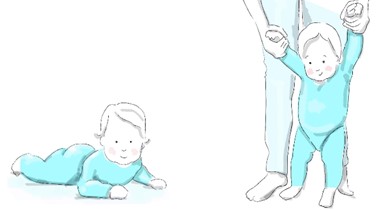8 weird ways pregnancy can change your body

Your typical heartburn and morning sickness get plenty of air-time, so Sarah Tennant investigated the more bizarre changes that can occur when our bodies are growing another human.
The internet helps connect like-minded people. While the repercussions of this are not always positive, when it comes to shame-facedly Googling symptoms too weird to tell anyone in real life, it can provide blessed relief. The sheer giddy validation of a thousand search results telling you: no, you're not crazy, that's a Thing. On the off-chance that you haven't already Googled the phenomenon which is making you feel like a mutant freak, let me assure you: when it comes to pregnancy and birth, no matter how odd the symptom, it's probably a Thing. Let’s look at some examples...
The symptom: my glasses prescription is off since I got pregnant
Why it's a thing: Many common pregnancy symptoms can best be explained by the fact that pregnancy makes you – and this is a scientific term – juicier. Increased salivation? Juicier. Breasts leaking colostrum? Juicier. Low blood pressure? Probably the rapid increase in blood volume that occurs during the second trimester: in other words, you're juicier. Eyesight going wonky when you're pregnant? Yes, this is also related. Did you know it's possible to retain water in your eyeballs? Never let it be said that pregnancy isn't glamorous. The extra liquid can actually plump up an eyeball so much that the shape and thickness of the cornea temporarily alters, making women a little more nearsighted than usual. For this reason, getting new glasses or contact lenses fitted during pregnancy isn't recommended – and laser eye surgery is definitely off the to-do list.
REALLY?! You know those people who swear they can “just tell” when a woman is pregnant?
There are many subtle signs they might be picking up on - the chloasma or 'mask of pregnancy', the nausea, the fact that the woman is riffling through racks of baby clothes at Farmers. Or, the woman might have a puffy face. Specifically, an enlarged nose - rhinitis of pregnancy. There's no great mystery to it - once again, it falls under the category of general juiciness - and the effect is (fortunately) usually fairly subtle. But, go on, rush to the mirror and examine yourself anxiously.
The symptom: when I breastfeed I feel really sad and anxious, but only for a minute
Why it's a thing: Depression can be a natural response to breastfeeding if you have, say, thrush or a bitey baby. But for some women, breastfeeding itself – normal breastfeeding – can trigger short, but intense, bursts of extreme depression. It's called D-MER – dysphoric milk ejection reflex. When a woman's milk is about to let down, dopamine levels briefly dip as prolactin levels rise. Usually this goes unnoticed, but for D-MER sufferers, the drop in dopamine triggers brief intense emotions, which can range from homesickness to sadness, hopelessness, anxiety or anger. The feelings typically last for only a minute or so, then vanish as letdown occurs. Perhaps that doesn't sound too bad, but at the time it's immensely unpleasant – some women even feel suicidal.
It's such a bizarre symptom that it can take mothers a long time to associate the sudden sadness with the breastfeeding; and longer yet to realise it's a legitimate medical phenomenon. My best friend Talia, who developed D-MER with her second baby, was thrilled when Google informed her the brief bursts of hopelessness weren't just her being (as she put it) a crazy person. Now she can brace herself for the onslaught of emotion and finds it less debilitating, referring to it as her 'cool party trick' – happy, to hopeless, to happy again – in under two minutes! Unfortunately there is no cure for D-MER, other than weaning.
Many mothers find their symptoms decrease as their baby gets older and their milk supply begins to dwindle, leading to less noticeable letdowns (pun not intended). Oddly, having D-MER with one baby doesn't mean you'll have it with future babies.

SAY WHAT? When babies develop in the womb, a 'milk line' briefly forms, running from their armpit to groin. Usually there are just two nipples and the associated plumbing, but occasionally extra nipples (appearing like moles or enlarged pores) and/or breast tissue can form elsewhere along the milk line. Extra breast tissue can go unnoticed until it starts to swell late in a woman's pregnancy. And, yes, you can then leak milk in unexpected places. The good news is that, as long as the baby doesn't actually suckle from the breast tissue, it should dry up within a few weeks. Doctors often recommend having the rogue tissue excised to avoid annoyance with future babies, especially if the tissue swells and feels uncomfortable.
The symptom: my voice is deeper than it used to be
Why it's a thing: Yet another body part affected by pregnancy juiciness are the vocal cords (or 'vocal folds' as they're more precisely known). Pregnancy swelling tends to shift your vocal range down a notch – less soprano, more alto. In fact, pop star Adele was pregnant while recording the James Bond theme, Skyfall, and she's admitted that's why the song is pitched low – she couldn't make the high notes! And a similar thing happened with Kristen Bell while recording Anna's spoken lines for Frozen: “The pregnancy did change my voice. It made it deeper ... while I was extremely pregnant. After I had the baby, I had to go back and re-record those lines so they matched”. Vocal coaches warn against singers trying too hard to retain their top notes during pregnancy, because the increased bloodflow also makes vocal folds more likely to haemorrhage or tear with overuse. And it's not just the vocal cords which get juicier – so does your tongue. So if you develop a lisp during pregnancy, it doesn't mean you're regressing to childhood for complex psychological reasons. You're just talking with your mouth full.
The symptom: I have the hair of a stranger
Why it's a thing: It's common knowledge that hair tends to get thicker during pregnancy and fall out afterwards. This is because pregnancy hormones lock hairs into their growth phase, thus they don't fall out. When those hormones disappear after birth, all the hairs which would naturally have shed a few at a time now drop like autumn leaves. More unexpectedly though, pregnancy can occasionally cause women's hair to completely change texture. I'm talking corkscrew curls to straight, fine to coarse or vice versa. Nobody knows exactly why. Hair texture is determined by the shape of the follicles, so presumably pregnancy hormones somehow alter these. Many women report similar changes in hair texture during other hormonally-exciting periods of life – puberty and menopause, particularly. Some women find their hair gradually reverts to its previous texture. Others find another hormonal shift – like a subsequent baby – can result in yet another dramatic change. A few women find their hair never goes back to normal.
The symptom: my baby's kicking and I'm not pregnant!
Why it's a thing: So your baby's a month old … or eight months … two years … six … and one day you feel the unmistakable, oh-so-familiar thump of a healthy, vigorous 30-week foetus kicking you in the spleen. Only you're not pregnant. No, it isn't gas, you know what gas is like. You're sure you're not pregnant. Now it happens again, and you can actually see your tummy twitch where it was kicked. This is obviously a baby. Only it isn't. A tapeworm with legs? An alien parasite? It’s definitely a Thing, but honestly: no one knows why.
There's a theory that it's related to mini-contractions of the uterus, slowly getting back to pre-pregnancy size over 18 months; but women get phantom kicks years and years after giving birth. There's a theory that it's related to nerves healing from C-section damage, but women who've only had vaginal deliveries feel the kicks too.
There's a theory that it's due to a deep yearning to be pregnant – sort of a one-symptom-only phantom pregnancy – but there are plenty of women scoffing loudly at that idea.
Our favourite is the theory that phantom kicks are caused by nerve memory. Just like an amputee feels a phantom limb after the real one's gone, your stomach feels a phantom baby once the real one's moved out. If you think of it as your body missing your baby's presence on a neurological level, it's kind of sweet. Compared to the tapeworm theory, anyway.
top image: twenty20 @leggybird

AS FEATURED IN ISSUE 34 OF OHbaby! MAGAZINE. CHECK OUT OTHER ARTICLES IN THIS ISSUE BELOW
















